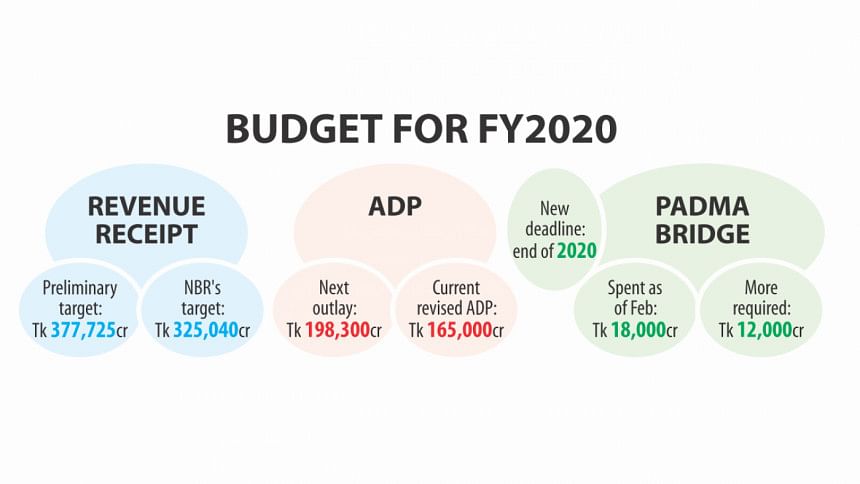New budget to cross Tk 5 lakh crore

Fiscal 2019-20's budget is set to cross the landmark of Tk 5 lakh crore as the Awami League-led government, fresh from being elected to a third term, looks to scale up implementation of the mega projects announced in previous terms.
The upcoming national budget, due to be placed in the parliament on June 13, will likely be about Tk 5.23 lakh crore, up 12.50 percent year-on-year, according to the finance ministry's preliminary projections, which were made in December last year.
Finance Minister AHM Mustafa Kamal has already held three pre-budget meetings with economists and parliamentary standing committees, while Prime Minister Sheikh Hasina has advised him to discuss different issues of the budget with his predecessor.
“Expectations will be high not just because it will be the new finance minister's first budget but also because it will be seen as the first concrete manifestation of how the government will go about fulfilling the pledges made in its election manifesto,” said Zahid Hussain, lead economist of World Bank's Dhaka office.
The government's target is to complete the construction of some of the mega projects like the Padma bridge and metro rail in the revised timeframe, said a finance ministry official.
The construction of the bridge, which will cost Tk 30,000 crore, was supposed to be complete by December 30 last year, but it is still some way off. The new deadline is 2020.
As of February, a total of Tk 18,264 crore has been spent for construction of the bridge, meaning about Tk 12,000 crore needs to be made available over the next fiscal year. “The government wants to make visual progress in construction of some important mega projects like the Dhaka Metro Rail, Padma Bridge Rail Link and Rooppur Nuclear Power Plant -- they will need big allocations in the next budget.”
So the projected size of the next budgetary allocation is not too high considering the demands of the mega projects and other expenditures of the government, he added.
The total outlay for the annual development programme will be Tk 1.98 lakh crore in fiscal 2019-20, up 20 percent year-on-year.
“Whether or not the size of the budget is Tk 5 lakh crore or less is not what matters for the economy,” Hussain said.
Past experience shows the large gap between the original size of the budget and its actual realisation limits the former's relevance to no more than mere symbolism.
For instance, in fiscal 2016-17 a Tk 3.41 lakh crore budget was announced but it was revised down to Tk 3.17 lakh crore. But in the end Tk 2.69 lakh crore was used.
Similarly, last fiscal year the budget was originally fixed at Tk 4 lakh crore only for it to be trimmed down to Tk 3.71 lakh crore. Eventually, Tk 3.21 lakh crore was put to use, according to data from the finance ministry.
“It will indeed be refreshing if we see a shift in emphasis from the sheer size of the original budget to greater focus on expenditure prioritisation, revenue mobilisation and improving implementation,” Hussain said.
The new finance minister has the opportunity to make a paradigm shift in the budgetary process, starting from reducing the inordinate length of the budget speech to making every word in the speech count by backing it up with an expenditure programme.
He can craft a resource mobilisation effort that will increase the tax-GDP ratio by making the taxation regime more efficient and taxpayer friendly, the World Bank economist said.
According to preliminary estimates, the revenue collection target for next fiscal year will likely be Tk 3.78 lakh crore, of which the National Board of Revenue will shoulder Tk 3.25 lakh crore.
Meeting this target is largely dependent on the implementation of the VAT law from next fiscal year, said NBR officials. Kamal has already hinted that the VAT law will take effect from next fiscal year, with the highest slab brought down to 10 percent from 15 percent to appease the business community.
“We would like to see a budget that sets expenditure and financing targets based on historic performance, economic conditions and stakeholder expectations. In short, we would like to see a budget that marries good economics with good politics,” Hussain added.

 For all latest news, follow The Daily Star's Google News channel.
For all latest news, follow The Daily Star's Google News channel. 



Comments